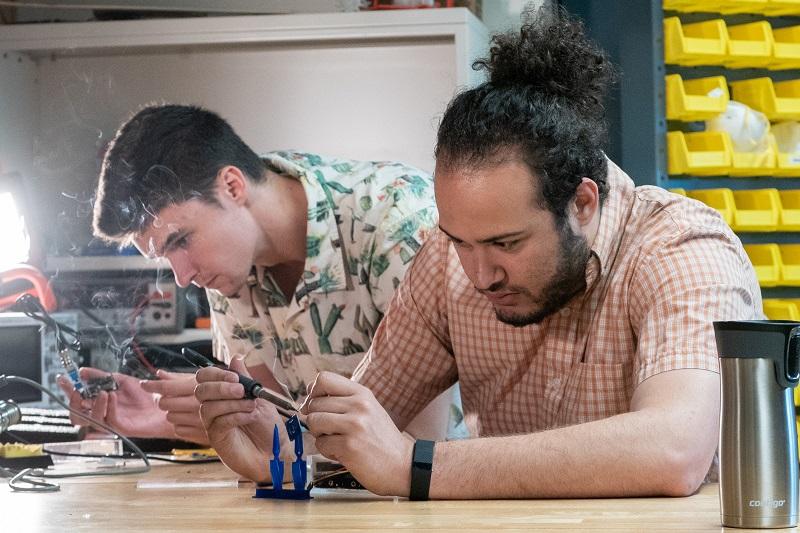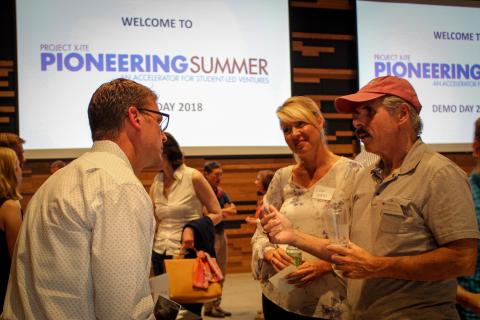Q&A: What Makes a Good Entrepreneur?
DU celebrates National Entrepreneurs’ Day

On Tuesday, Nov. 19, the United States observes National Entrepreneurs’ Day in honor of the creative minds that have sparked business and innovation across the nation. The University of Denver has a rich culture of entrepreneurship as well, through its academic programs and extracurricular programming like Project X-ITE.
As his day job, Michael Caston is an associate professor in the Department of Mechanical and Materials Engineering at the Ritchie School of Engineering and Computer Science, teaching courses in product development and entrepreneurship. He also serves as executive director of DU’s Innovation Labs and is a Project X-ITE Faculty Innovation Fellow. Outside of academia, Caston has started several businesses (his first, as a 12-year-old). Recently, he shared his thoughts about what makes a successful entrepreneur with the DU Newsroom. The conversation has been edited for brevity and clarity.
You formed your most recent venture, CAMIC designs, in 2007. How has entrepreneurship evolved in the years since?
In many ways, becoming an entrepreneur is getting easier. Entrepreneurs are able to work smarter than ever before — we have access to data-driven decision-making. Marketing a business has also dramatically changed.
When we developed our first product line in 2007 for CAMIC designs, we thought we were done with all the hard work. Until we realized the biggest mountain we had to climb next was the marketing of our products. At that point, it felt like product development was 5% of the work and marketing was 95%. It was challenging to both locate and market to our target customers. And it was expensive. Now there are tons of smart, inexpensive online marketing solutions with tools to optimize specific channels. Another example: For our various websites, we hand coded close to 10,000 webpages. This was extremely time-consuming to build and to update. Now there are so many options for well-designed templates that have dynamic visual output, integrate with other platforms and are SEO-optimized.
What are the characteristics of a good entrepreneur? What does it take to make it?
Entrepreneurs need to be blindly optimistic almost to the point of it being a fault, because an entrepreneur is going to fail over and over again, and they will be told “no” over and over again. You need to believe in what you’re doing even when no one else does. An entrepreneur also has to be resourceful. When you have an unproven concept and lack legitimacy as a new venture, you have what we call a “liability of newness.” It’s a given that entrepreneurs are going to work 24/7, so the next precious resource is money. An entrepreneur must find the fastest and cheapest ways to test out their new ideas. This is called building a minimum viable product. The purpose is to get feedback quickly from potential markets and iterate cheaply until traction is gained and more investment makes sense.
What is the most important lesson you try to pass on to your students?
The most important lesson I teach my students is to know their customer. If you don’t put your consumer at the center of every decision you make, and truly understand the problem you are trying to solve, you may very well end up with a product or service that there is no market for. Listen to your customer. What are their pain points? First, uncover the opportunities for true innovation and build from there.
What impresses you most about the DU students you see pursuing entrepreneurship?
DU student entrepreneurs are confident. They are unafraid of failing. In one of my recent classes, I had DU entrepreneurs speak to my students about what it’s like being an entrepreneur, and one piece of advice one of the speakers, Isaiah Silva [who has developed his company, Atomata, with support from DU and Project X-ITE], gave to the students was, “Now is the time to launch your startup. Now, while you’re a student here at DU.” And his reasoning is that you can fail here without serious repercussions and learn from those failures, because DU provides amazing resources and a strong support network for student startups. I completely agree with this. There is no better time than now for a DU student!
How does DU support student entrepreneurs?
The resources that DU offers to student entrepreneurs are ones that I could only have dreamed about when I was in school [when Caston created multiple startups himself]. The Innovation Labs provide product development support, coworking and incubation space and expertise. Project X-ITE offers incubation space and programming through Incubator X, funding and mentoring through Pioneering Summer, workshops around market research, pitching, market validations, intellectual property, protection and so much more. The law school offers free legal advice through their Community Economic Development Clinic. The tech transfer office offers advising and resources for student startups looking to commercialize their technology. There are so many free resources on campus that I can’t list them all here.
DU has a large number of faculty and staff cheerleaders from all over the campus and from different disciplines that want to see students succeed. It really is a great place for a student to try out a new idea and be completely supported.





